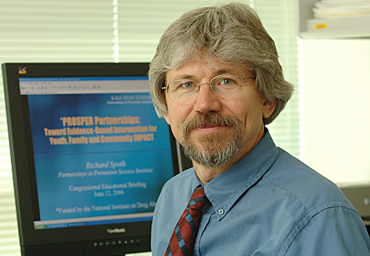ISU receives $11.6 million grant to continue project to strengthen families, communities
11-08-07

Richard Spoth directs Iowa State's Partnerships in Prevention Science Institute and its PROSPER program. Photo by Bob Elbert.
Contacts:
Richard Spoth, Partnerships in Prevention Science Institute, (515) 294-5383, rlspoth@iastate.edu
Jack Payne, ISU Extension, (515) 294-4603, jpayne@iastate.edu
Pandora Lamar, Partnerships in Prevention Science Institute, (515) 294-5383, plamar@iastate.edu
Mike Ferlazzo, News Service, (515) 294-8986, ferlazzo@iastate.edu
ISU receives $11.6 million grant to continue project to strengthen families, communities
AMES, Iowa -- The National Institute on Drug Abuse has added $11.6 million to an earlier $21.1 million award to the Partnerships in Prevention Science Institute (PPSI) at Iowa State University to continue its Promoting School-Community-University Partnerships to Enhance Resilience (PROSPER) project. The new award will support the project for an additional five years.
Through partnerships established with local communities and assisted by ISU Extension, Iowa State's Partnerships in Prevention Science Institute conducts research to promote capable and healthy youths, adults and families. PROSPER attempts to strengthen families and communities, promote positive youth development, and reduce youth substance use and other problem behaviors -- literally helping families and their communities "prosper" through various intervention methods recommended by ISU researchers.
"The rates of youth substance abuse and related problems in both rural and urban areas continue to be high," said PPSI Director Richard Spoth, who also directs PROSPER. "Although there are now skill-building and family strengthening programs proven to address these problems, they continue to be underutilized. NIDA's ongoing support for our project is an indication they believe our partnership model is a promising strategy for supporting the long-term, quality delivery of scientifically validated prevention programs."
The initial phase of the PROSPER project involved more than 6,000 youth in 14 Iowa communities. The Pennsylvania State University also collaborated with ISU to implement the project in 14 Pennsylvania communities through Mark Greenberg, director of the Prevention Research Center at Penn State. The PROSPER project has now reached more than 12,000 youths in the two states.
Researchers showed positive outcomes from the first phase of the project through a number of studies published in professional journals, documenting improvements in family functioning and lower levels of adolescent substance use where programs have been delivered. Their results also showed effective community partnership mobilization, successful local recruitment of community families for the program, high quality delivery of validated prevention programs, and successful community fund-raising to sustain the community programs.
"PROSPER can make a difference in the lives of Iowa youth, families and communities," Spoth said. "The project helps give families and youth the skills to promote the development of young people into healthy adults."
"Children and youth are our nation's most valuable resource," said Jack Payne, vice president for Extension and Outreach. "Unfortunately, a significant number are at risk because of substance use and other social problems. Schools alone can't solve these complex problems. What can make a difference are partnerships involving university Extension staff, schools, families and other concerned local citizens -- like the ones we have established through this program."
Spoth says that PROSPER is intended to be a model for a national network of partnerships.
For the past 17 years, Spoth and other ISU scientists at PPSI have evaluated preventive intervention programs. Their research has found that programs like PROSPER can strengthen skills that young people and their families need to resist substance use and social misconduct, and their participation in these programs can benefit them through young adulthood.
"Economic analyses suggest the programs are a good investment of public dollars," said Spoth, who led a study that found for every $1 invested in prevention, an estimated $9.60 is saved in projected costs to society.
-30-